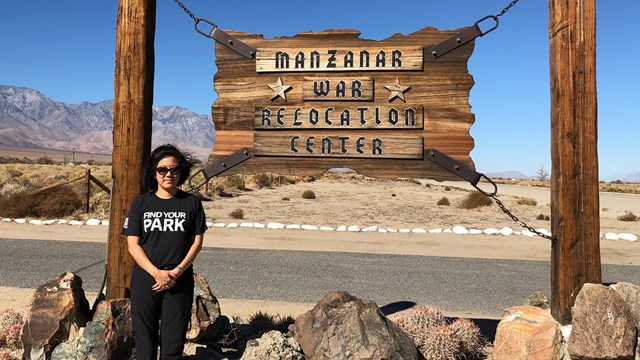This area of the Partnership Toolkit offers ideas for partners to engage with NPS communications initiatives as well as resources for communications staff at partner organizations.
Communications Messaging and Initiatives
From significant anniversaries and commemorative moments to safety messaging and trip planning, the NPS and partners across the country have worked to align our communications across the parks community to elevate our nation's important stories and places.
Join us in the initiatives below—and share your great content ideas with us, too!

Partner with us as we celebrate the nation's 250th anniversary in 2026! Learn about Freedom 250 and America250 opportunities.

There are even more ways to celebrate National Park Week this year. Each day has a special theme, find yours!

Partners: help us find and share your stories!

How Communications Supports NPS Imperatives
In addition to ensuring that the public is aware of the mission of the National Park Service, communicators across the service have always supported enduring NPS imperatives like keeping people safe, helping them plan their visit, and ensuring transparency and public trust in the NPS as a federal government bureau.
Our partners play a key role in helping the National Park Service accomplish our mission and goals. This includes amplifying communications that support NPS imperatives.
The list below focuses on the NPS imperatives that can be advanced with communications tools, platforms, media engagement, materials, publications, voice, our work with partners, and our personal interactions. Also, it's important to note that because the field of communications is less able to assist with some NPS imperatives like conducting scientific research or surveys, documenting historic structures, and contracting, this list focuses primarily on NPS imperatives that communicators can help advance.
So it helps to begin the sentence with, “The NPS communicates to...”
- keep people safe.
- protect resources.
- meet visitor expectations for trip planning.
- foster public enjoyment, inspiration, and education both in person and virtually.
- ensure employees have the information they need to be safe, included, inspired, successful, and mission-focused.
- support effective and efficient operation and administration of the bureau itself.
- inform the public about government actions, facilitate participation in the public planning process, and promote transparency.
- inspire the public to learn about ways that they can participate in and support our work.
- ensure community leaders, and the American people more broadly, are aware of and can benefit from NPS programs available to help their communities.
- foster and strengthen public trust in the NPS and reinforce the integrity and appeal of the NPS brand.
- ensure that public lands are accessible to all and that everyone feels welcome.
- lift up less well-known parks and stories.
Ideally, individual communications initiatives, projects, platforms, or campaigns can support multiple imperatives.
Join us! How can your organization help us advance these imperatives? Work with your partner park or reach out to the Partnerships Office (e-mail us) or the Office of Communications (e-mail us) to learn more.
Helpful Resources and Information
- In the NPS News area, you can find general information with NPS facts and figures.
- See NPS news releases.
- See DOI news releases.
- Feel free to reach out to your park, a regional office, or the Washington Office of Communications if you have questions or need more information.
Online Introductory Training for NPS Communicators and Partners
While communicating on behalf of a public agency such as the National Park Service has many similarities with private sector practices, the roles and responsibilities can differ, especially with regard to transparency and accountability and the reasons why we communicate. Working with the Eppley Center for Parks and Public Land at Indiana University, the NPS developed a basic overview of public affairs and digital communications for NPS employees which may be useful for employees of other public agencies as well as the partners who work with us. This survey course is designed to introduce new communicators to topics such as message development, communications planning, writing and editing, working with news media, digital and technical media, intellectual property, branding and graphic identity, and the authorities, responsibilities, and policies governing our public communications. The series includes five courses, each of which will take several hours to complete. It is available for partners on Eppley's Platform and for NPS employees via the NPS Communications Community (interal link).
Course 1 -- Communications Policy and Practices (3 hours)
This course covers why your agency needs to communicate, basic tools and terms for communicators, and how to apply policy to communications. You'll also get an overview of accessibility laws and policies, an understanding of obtaining permissions for informational use, and information about communicating agency priorities.
Course 2 -- Communications Tools (3 hours)
This course explores commonly used tools such as digital media, social media, and multimedia, among others.
Course 3 -- Media Relations (3 hours)
This course will cover basic media relations tools and terms and guidance on how to interact with the media and provide information accurately and consistently.
Course 4 -- Topics in Communications (3 hours)
This course will cover basic tools and terms, an overview on communicating crisis and special events for the public, information on branding and graphic identity and working with partners on communications efforts.
Course 5 -- Planning Your Communications Strategy (5 hours)
This course will cover best practices and elements of a communications plan, help you identify goals and key audiences, craft messages, and how to bring these elements together to creation a communications plan. It also offers concepts for evaluating the success of your communications plans and products.
Last updated: February 5, 2026
